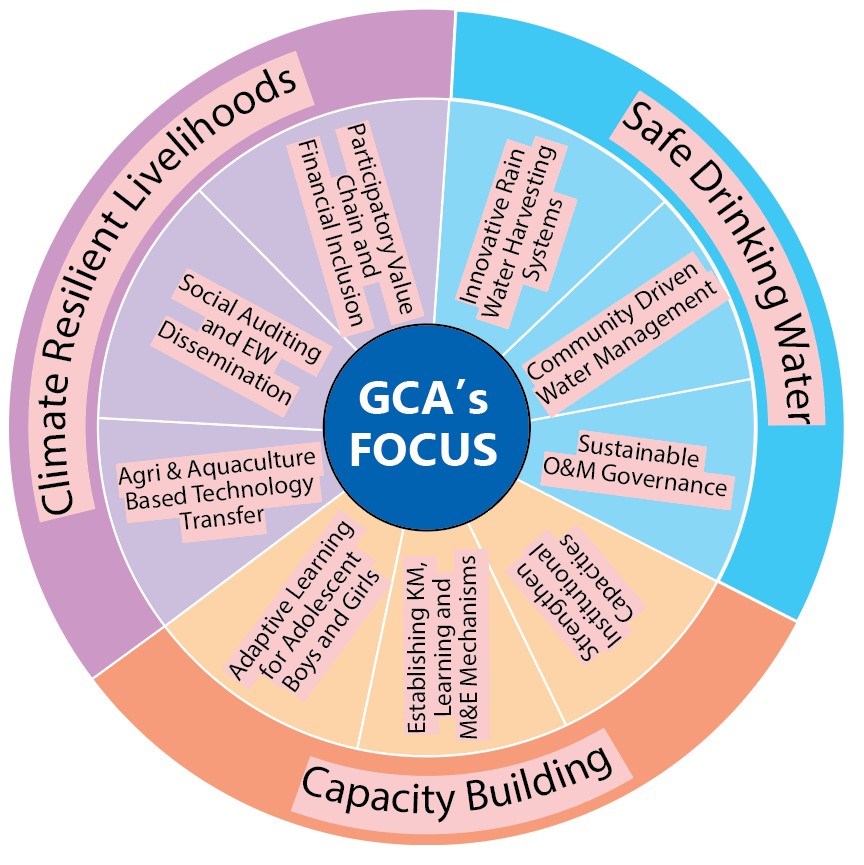About US
Welcome to the “Enhancing Adaptive Capacities of Coastal Communities, Especially Women, to Cope with Climate Change-Induced Salinity” project, also known as the Gender-responsive Coastal Adaptation (GCA) project. Led by the Bangladesh Ministry of Women and Children Affairs (MoWCA), this initiative supports the Government of Bangladesh in helping coastal communities—particularly women—adapt to the challenges of climate change, including salinity that endangers their livelihoods and water security.
The GCA project, launched in 2019 with financial backing from the Green Climate Fund (GCF) and co-financing from the Government of Bangladesh (GoB), aims to support the climate-vulnerable communities of Khulna and Satkhira. With technical assistance from UNDP, the project will continue through June 2026, focusing on empowering these regions most impacted by climate change. Women and adolescent girls are at the heart of this effort, taking the lead in building resilient livelihoods and finding safe drinking water solutions. By equipping them as "change agents," the project helps communities plan, implement, and manage adaptive strategies to cope with the growing impacts of climate change.
The project aims to deliver key outcomes, including climate-resilient livelihoods with a focus on empowering women and strengthening the capacity of coastal agricultural communities. It also provides gender-responsive, year-round access to safe and reliable climate-resilient drinking water solutions. Additionally, the project enhances institutional capacities, knowledge sharing, and learning for climate-risk-informed management of livelihoods and water security. Through this project intervention It is estimated that a total of 719,229 people from 39 coastal unions of five upazilas in two coastal districts-Khulna and Satkhira will benefit directly and indirectly through this project intervention.
The project places a strong emphasis on three key areas: Climate-Resilient Livelihoods, Access to Safe Drinking Water, and Capacity Building. It seeks to strengthen the ability of coastal communities to adapt their livelihoods in response to climate change impacts, ensuring they remain sustainable in the face of increasing salinity and environmental challenges. Additionally, the project prioritizes improving access to safe and reliable drinking water sources, vital for the health, well-being and economic empowerment of these vulnerable populations. Capacity building initiatives are also central, equipping individuals—particularly women—with the knowledge, skills, and tools needed to cope with climate-related threats and enhance community resilience over the long term.
Basically, the GCA project shifts from short-term, technology-led interventions to community-driven solutions that build ownership and capacity across stakeholders. This approach promotes long-term adaptive responses to protect livelihoods and water security. By raising awareness, building skills, and linking communities to markets, the project helps people move from non-adaptive livelihoods to climate-resilient ones, reducing vulnerabilities to future climate risks.
Climate-resilient water technologies, like rainwater harvesting and pond systems, provide alternatives to groundwater, helping communities adapt to seasonal changes and salinity issues. Strengthening the capacities of government, NGOs, and the private sector ensures that climate risks are incorporated into livelihood and water management strategies, while empowering women as "change agents" to lead adaptation efforts. Additionally, improving the Ministry of Women and Children Affairs' (MoWCA) ability to integrate gender and climate considerations into policies enhances social targeting and climate-resilient development across sectors.
